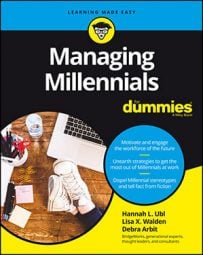While it’s easy to laugh at the lanky, bearded, and tattooed models used in every Millennial ad campaign, there’s a reason those ads exist. They do actually appeal to a specific type of Millennial, and it’s not surprising if as a manager, you’ve come across one or two of these Hipster Millennials during your career.
A portrait of a Hipster Millennial
While no one can know the Millennial population that you manage, you might know someone like Delilah. When you hired her, you thought, “Wow, you look just like my daughter’s friends who all live in the city and wax poetic about their love of local beers.”She wears thick-rimmed glasses; has a vast collection of skinny jeans in shades of mustard, black, and maroon; and usually pairs those skinny jeans with a flannel button-down, a cropped sweatshirt, or an oversized sweater. She has a few visible tattoos, her favorite being an outline of her home state of Minnesota on her inner forearm. Her hair changes color and length more times in a year than yours has over a decade.
You saw her Spotify playlist once (because she always wears headphones at work) and when you remarked that you didn’t know a single artist, she suppressed a smirk, “I’m not surprised. They’re all pretty up-and-coming to the scene.” This makes you feel even cooler as you stroll toward your minivan at the end of the day.
Delilah is the epitome of work-life integration: She demands flexible hours for her art showing of papier mache antelopes or her band practice (she plays the banjo). She tried to host a taste-test of her home-brewed kombucha at lunch, and on more than one occasion she’s attempted to convince people of the power of being a fruitarian. Delilah rebels against corporate staples like dress codes, strict schedules, and continuing to follow a process just because that’s how it’s always been done.
While you appreciate her ideating mind and proclivity for disruption, you’ve grown wary of asking for her opinion because she usually assumes her ideas are best while quoting David Foster Wallace or Dave Eggers.
Breakdown of the Hipster Millennial
Wow, this Millennial is certainly uniquely challenging because, well, she is so unique. While Delilah appears to be a super hipster, she may have a lot in common with her hipster persona peers because she- Believes her ideas are the best and most innovative
- Craves only unique ways of doing things at work
- Opposes anything that reflects corporate professionalism
- Has a tendency to dress down even when intending to dress up
- Is a diligent worker, but demands a flexible schedule
- Has visible tattoos
What makes a Hipster Millennial tough to manage
In brief, Hipster Millennials pride themselves on their unique qualities and their one-of-a-kind approach to all things in life. That is an inherent Millennial trait, just for the record, but it’s exaggerated in the hipster mindset. This makes them a population of Millennials who want to brand themselves by their unique qualities when sometimes what they need to do is, simply put, get in line like everyone else. They also take work-life integration to a level unlike other Millennials because they so want to buck the traditional norms of work life.Why Hipster Millennials can be great
If you manage a Hipster Millennial, think of her not as a cliché, and instead embrace the strengths she brings to your organization:- At least she’s always honest about her opinions and willing to share them.
“I appreciate that if [the Millennials I’ve worked with] are given a chance to contribute, [I] find that they are very in tune to the pulse of the organization and they can give you very valuable feedback.” — Jayson M., Manager
- She has such interesting, out-of-the-box ideas and approaches to the way she gets her work done.
- She embraces integration as the new model of work-life balance; generations that follow will expect a similar set-up.
- She does more than her job description, is always striving to improve, and never settles for good when she sees an opportunity to be great.
Handling the Hipster Millennial
Before grabbing your hair in a tight fist and readying yourself to pull, read through these tips to find whether there’s any unique approach you haven’t tried to reach the unicorn Millennials. In all seriousness, they usually have great ideas that just need to be fielded and vetted in the right way and in the appropriate environment.- Coach them on how to present ideas. As a segment, the Hipster Millennials pride themselves on sharing unique, out-there ideas — and that’s not a bad thing! But their presentation could leave something to be desired (read: they share ideas with apparently little regard for why things are done a certain way). Coach them on how to present ideas in a way that everyone can hear without feeling disrespected, hurt, or offended in any way.
- Find authentic shared interests. This group defines themselves by their interests — whether that’s music, theater, dance (yes, they like the arts), food, beer, or something nostalgic. If you can find an authentic connection with them in that area, it will help build a manager-employee relationship in the personal sphere that can then extend to the professional sphere.
- Try to focus on results. This tip is a tale as old as time, but it’s especially important with this Millennial persona. They’ll have unique ways of approaching the workday and getting things done. You might not agree with all of their methods, but if it’s not disruptive to the rest of the team, don’t step in just because it’s not the way you would do it. If they’re meeting their goals, let them choose their own path, even if it befuddles you.
- Embrace the weird. have their quirks, but that can also be a sign of creativity. Embrace those quirks and invite them to ideation sessions. You never know what they may come up with!

